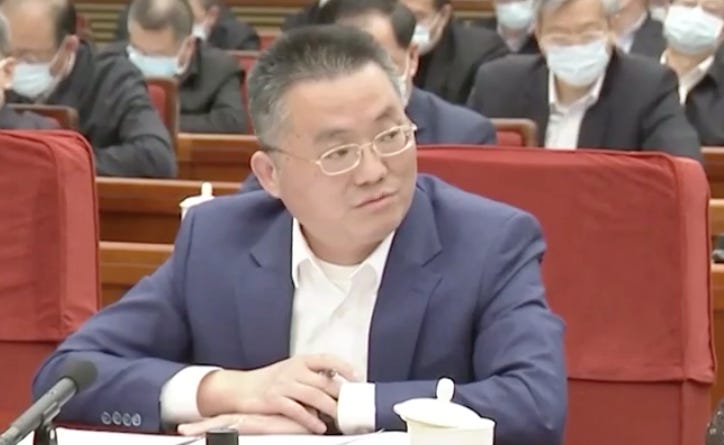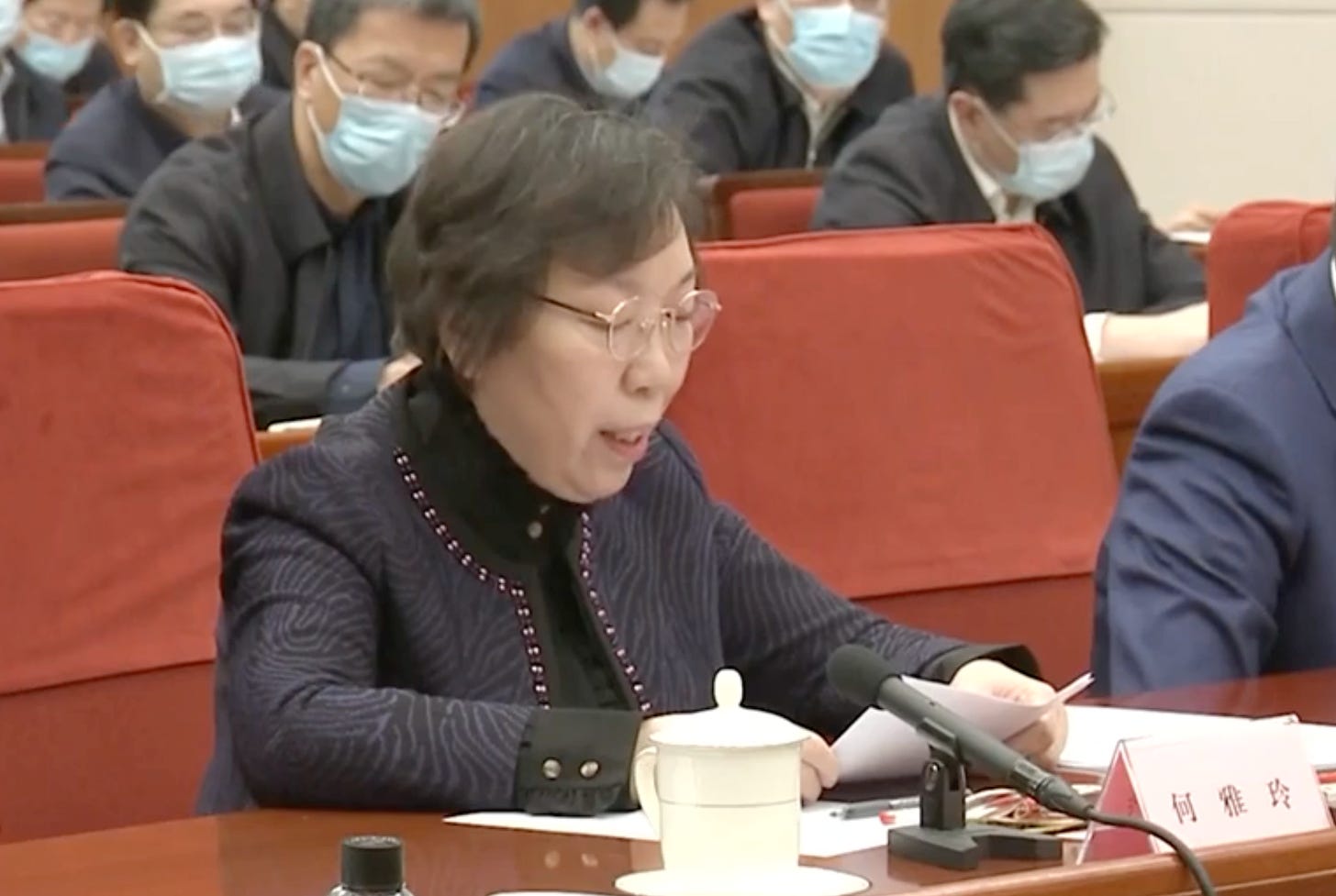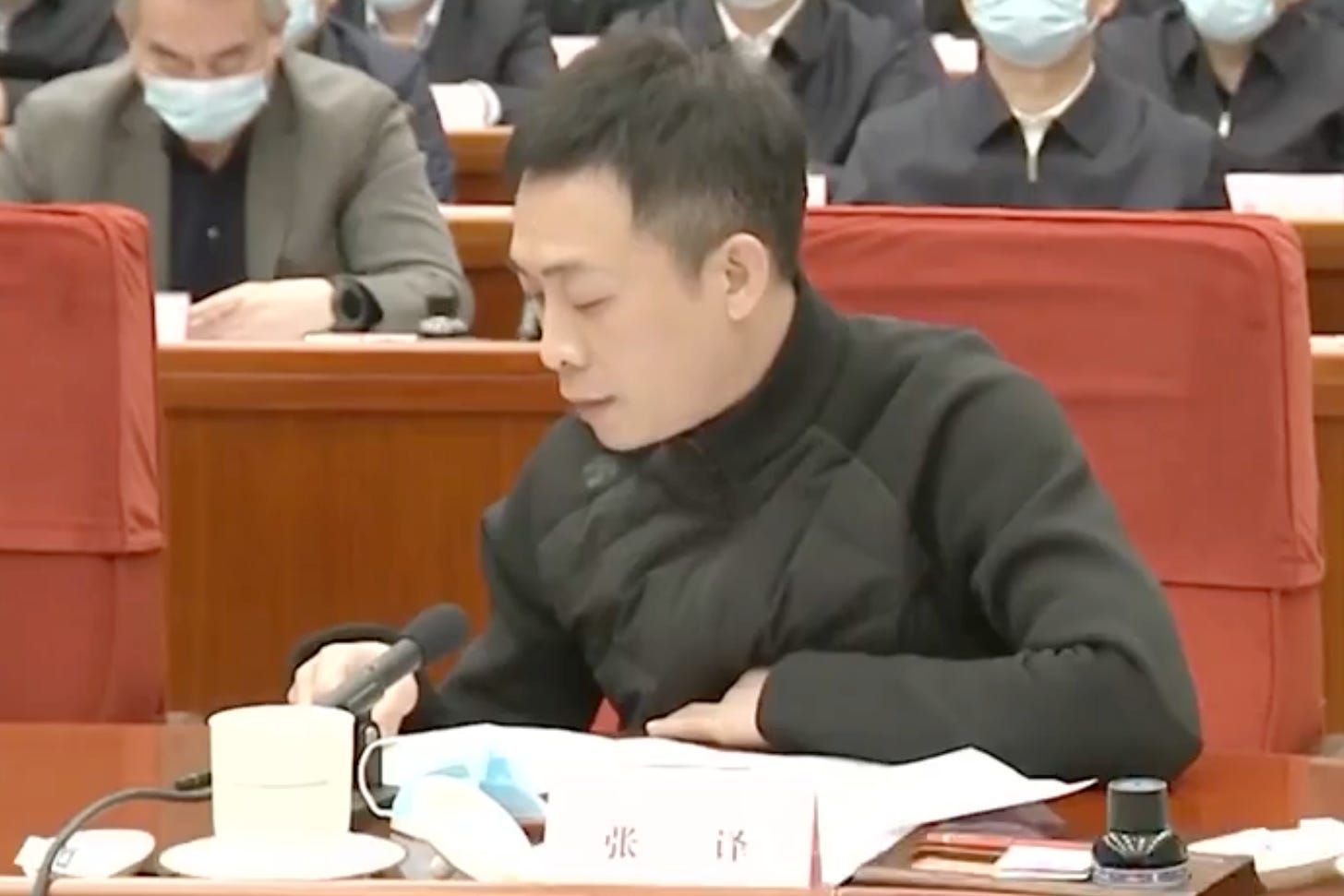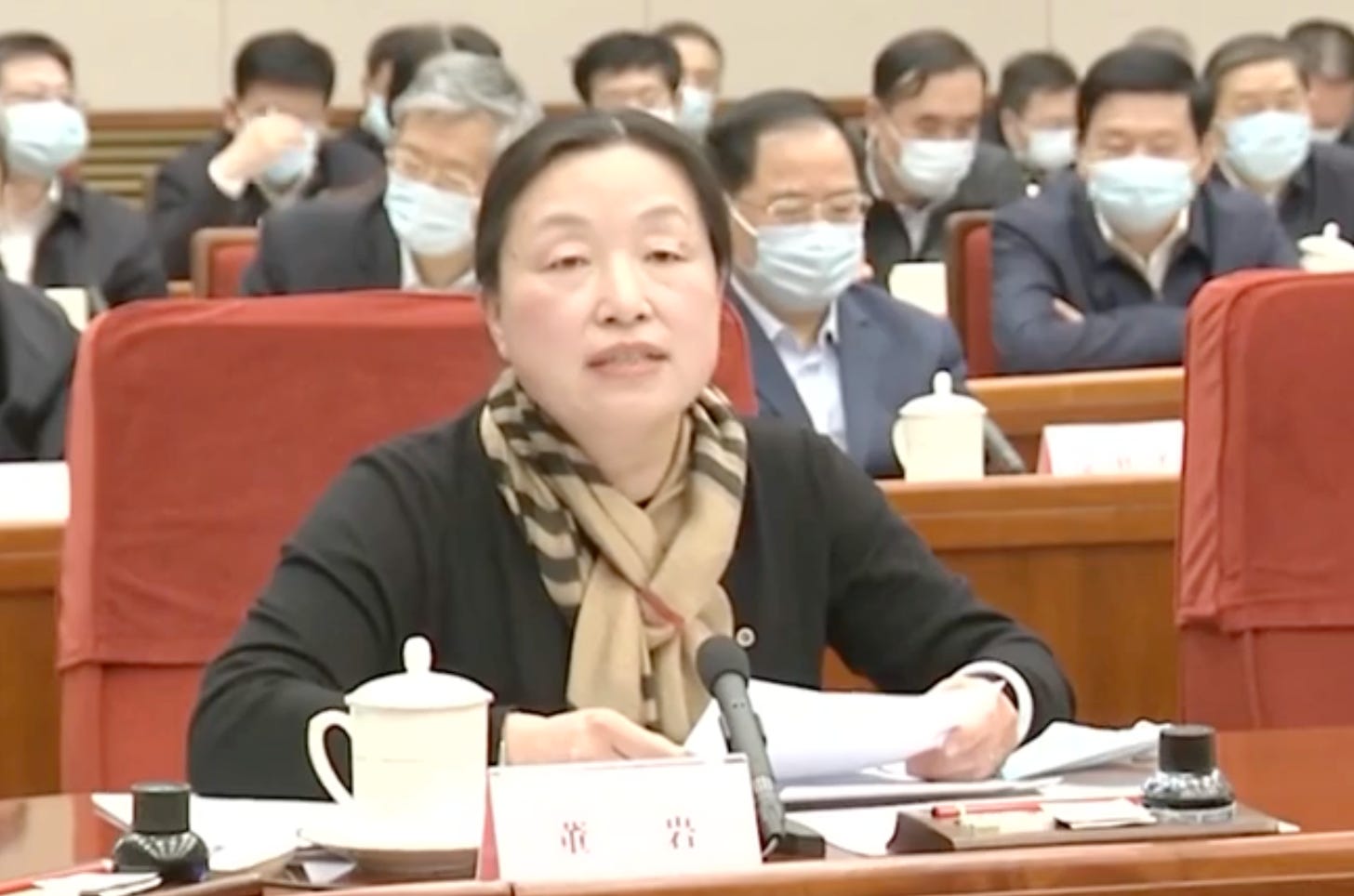Who sat at Chinese premier's roundtable?
Academics, entrepreneurs, grassroots citizens, athlete, and actor were consulted before the release of the government work report of China.
Chinese Premier Li Keqiang chaired a seminar on Feb. 6 to solicit opinions on the draft government work report from grassroots organization representatives and people from all walks of life. It is a custom to hold seminars before the government work report is finally presented at the National People's Congress. [Another seminar took place on Feb. 13 with the central committees of the non-Communist political parties, head of the All-China Federation of Industry and Commerce, and personages without party affiliation.]
China has achieved "hard-won results" through "painstaking efforts" in 2022, said Premier Li, looking back at a year-long wrestle with COVID-19 outbreaks, "the Chinese government is keenly aware that enterprises, especially companies in the consumer service sector, small-and-medium-sized enterprises(SMEs), and individual businesses face a variety of difficulties." However, the economy remains satisfactory so far, remarked the Premier, thanks to innovations in regulations and policies.
Nine representatives delivered a speech at the meeting [video]. Whatever they talked about is not disclosed to the public, but there are clues as to what they were summoned for. They are, reported by Xinwen lianbo, selected on the basis of their identity as expert and scholar, entrepreneur, representative of education, science, culture, health and sports, and grassroots citizens.
GRR looks through the representatives' past history and area of expertise, hoping to shed some light on the government work report which in turn spells China's focus in the forthcoming year. See the following paragraphs for key profiles of the nine speakers:
1. Wang Wei, Research fellow and Director-General, Institute for Market Economy, Development Research Center of the State Council (DRC) 国务院发展研究中心市场经济研究所所长王微, is also an expert of the National Inter-Ministerial Joint Committee for Development of Modern Logistics. Her research interests are on policy and regulation of the service sector, market system and mechanisms, logistics, urbanization and housing policy and consumption policy. She is awarded government special allowance and concurrently a professor and tutor of Ph.D. candidates at Renmin University and the University of International Business and Economics.
Wang's early work at the DRC centres around consumer service and CPI (Consumer Price Index) performance, but she is getting increasingly focused on logistics. Having penned four research reports on Chinese railways in the last three years, she may just be the expert to consult on boosting domestic and international circulation, a goal raised by the Party in 2020. Wang is also dedicated to highlighting the importance of logistics to consumption. In an interview by Xinhua on Dec. 29, 2022, she remarked that the shortcomings of China's logistics system have led to underperformed consumption and investment needs and then provided five ways of boosting modern logistics in China's 14th Five-year Plan period.
2. Yao Yang, Dean of The China Center for Economic Research National School of Development, Peking University 北京大学国家发展研究院院长姚洋, is an expert in development economics and political economy. A prolific and influential academic, he writes on economic growth, work relations, land systems, ownership transformation, and democracy in China. His most popular study, on land lease and rural reforms, has attained more than 700 quotations since 2000, according to Google Scholar. Yao is also an open advocate of an open market economy and modern financial systems, and often analyzes the institutional features of the Chinese government.
Yao has more than 61,400 followers on Weibo, the Chinese equivalent of Twitter. But that is just a tiny slice of the attention he receives by posting remarks through media interviews. Although Yao's academic papers always examine macroeconomic questions, he is a frequent commentator on current affairs, from post-pandemic vouchers to university education. On Dec. 3, Yao, along with five other economists, published The Suggestions on Lifting Restrictions on Economic Activities, which was seconded and hotly debated by numerous people online. His suggestions correspond with China's optimization of COVID measures just five days later (also known as "ten new measures 新十条"). [Check out GRR's report on Yao Yang's views on post-pandemic development of China]
3. Feng Boming, Chairman of Sinotrans and Executive Vice President of China Merchants Group 中国外运公司冯波鸣, has more than 20 years' experience in the shipping industry. A Hong Kong University graduate, Feng has worked in multiple positions at several state-owned multinational shipping conglomerates (most primarily at COSCO Shipping Lines, which owns one of the largest fleets in the world). With hands-on experience in Hong Kong, Qingdao, and Athens, he is an absolute authority in harbor management, container transportation, and strategic management.
4. Qin Yanbei, founder and chairman of Ace Gifts & Crafts (Ningbo) Co., Ltd. 宁波艾森饰品有限公司创始人、董事长秦燕北 (see pic below on the left), started his business in 2003 and is now a successful merchant in foreign trade specializing in gifts, crafts, party decorations and holiday decorations. According to its profile, Ace Gifts & Crafts employs more than 300 workers, including 50 managers. The most popular product of Qin's company is multicolour flashing beaded necklaces made of plastic (see pic on the right) - charged at 1.56 U.S. Dollars per piece if you purchase more than 5,000 pieces. It is typical of the countless made-in-China trinkets that have flooded the world market and contributed to China's miraculous growth.
Ace is merely one of the SME manufacturers behind the success of Chinese exports. In Ningbo alone, there are dozens more companies, just like Ace, producing plastic decorations and making their way on the global market.
5. He Yaling, member of the Chinese Academy of Sciences and professor at Xi'an Jiaotong University 西安交通大学何雅玲院士. She was a representative of the 20th National Congress of the Communist Party of China (CPC) last year and is now an alternate member of the 20th CPC Central Committee.
As a scientist in the field of engineering thermophysics and energy conservation, Prof. He has long been engaged in the efficient utilization of energy and energy-saving theory, new energy utilization for solar energy and fuel cells, waste heat utilization, and other aspects with outstanding achievements. She was granted the State Natural Science Award twice, the State Technological Invention Award, and the Science and Technology Progress Award of the Ho Leung Ho Lee Foundation. She has published more than 600 academic papers, 68 authorized invention patents, and 12 books in Chinese and English, attaining more than 30,400 quotations and she has been selected as the top 1 percent of the world's most highly cited scientists for many years, according to her personal homepage.
Prof. He actively supports the development of solar thermal power generation and thermal energy storage technology. Since 2017, she has been continuously invited and participated in the "China Solar Thermal Electricity Conference". In April 2022, Prof. He published an article titled The Important Role of Thermal Energy Storage Technology in the Energy Revolution in the Science & Technology Review, saying that thermal energy storage is one of the most promising applied technologies and is playing an important role in the energy revolution.
6. Zhang Yi, a renowned Chinese actor 演员张译, has attracted widespread attention recently for his wonderful performance in the most popular show during the past Spring Festival holiday, 《狂飙》The Knockout, in which Zhang stars as an unswerving front-line criminal police officer struggling and fighting with local evil forces, which echoes a series of actions through which China has endeavored to crack down on gang crimes since 2018.
Zhang Yi earned his reputation for good acting in many dramas and films. His image as a limping young student-turned-soldier in military war drama《我的团长我的团》My Chief and My Regiment struck a deeper chord in the hearts of the people and he was widely praised for his acting as a father desperate to find his abducted son in feature film Dearest. Zhang has won many prestigious film awards such as "Golden Rooster Awards" and "People's Hundred Flowers Awards". He was also honored as "The Fifth National Young and Middle-aged Virtuous Artists" by CPC Publicity Department in 2022.
7. Xu Mengtao, an Olympic Champion Chinese aerial skier 滑雪运动员徐梦桃 and has won 27 World Cup victories and an Olympic Gold. She is also the current World Cup leader and became the first Chinese woman to win an Olympic gold medal in the Aerial Ski event during her fourth Olympics experience at the age of 31. She was one of Team China's flag bearers at the 2022 Beijing Winter Olympic's closing ceremony. She was honored as one of "Boao Young Leaders" for 2022 at Boao Forum for Asia. In an interview by Chinanews on Mar. 2, 2022, Xu believes it was her never-giving-up spirit that supported her to achieve a career grand slam despite so many failures and injuries on her way to the Olympic gold medal.
8. Dong Yan, clinic staff of Yuejin village in Mentougou District of Beijing 北京门头沟跃进村卫生室董岩 [No more detailed personal information about Dong Yan online]. The clinic undertakes basic medical and public health services in Yuejin village. In response to the COVID-19 prevention and control measures, the village set up a specialized working group and epidemic checkpoints at the village level, adopted household checks, distributed epidemic prevention supplies, sprayed disinfectant, and hung promotional posters, shouldering its weighty responsibilities and carried out epidemic prevention work in a down-to-earth manner.
9. Zhao Guang, chairman of Baotou Wangqi Agricultural Cooperative 内蒙古包头旺企农业合作社赵光 [Agricultural Cooperative is a mutually beneficial organization providing services such as the purchase of agricultural production materials, sales, processing, transportation, storage, and technology related to agricultural production and operation]. He came from Baotou, the largest city by urban population in north China's Inner Mongolia Autonomous Region, which is committed to building a national corn-soybean belt compound planting demonstration site, creating a new engine and bolstering for the high-quality development of Baotou agriculture. Zhao is expert at corn-soybean belt compound planting technology and explained it like planting 4,000 mus of corn and 6,000 mus of soybeans in 10,000 mus of land [mu, a unit of area (=0.0667 hectares)]. The planting density of corn increases, but the number of plants remains unchanged, increasing the yield of soybeans without reducing the gross output, and each mu can earn about 700 yuan more than purely planting corn.
Zhao is a representative of the new-era farmers from the prairie of Inner Mongolia Autonomous Region in the new context that traditional Chinese agriculture is facing a magnificent transformation. How to seize the opportunities of the times and promote the high-quality development of agriculture is not only related to the way out for farmers, but also related to the coordinated development of urban and rural areas. As is highlighted in the No. 1 central document for 2023, rural revitalization is the bedrock for national rejuvenation and has always been high on the agenda as the key to "Agriculture, Rural Areas and Farmers" issues in the new age.
Below is a translation of the official readout from Xinhua on Chinese Premier Li Keqiang's seminar on Feb. 6:
Chinese Premier Li Keqiang chaired a seminar on Feb. 6 to solicit opinions on the draft government work report from grassroots organization representatives and people from all walks of life.
Vice Premier Han Zheng attended the seminar.
Nine representatives delivered a speech at the meeting. They were Wang Wei, director general and senior research fellow of Institute of Market Economy, Development Research Center of the State Council; Yao Yang, dean of the National School of Development, Peking University; Feng Boming, chairman of Sinotrans; Qin Yanbei, founder and chairman of Ace Gifts & Crafts (Ningbo) Co., Ltd.; He Yaling, a professor at Xi’an Jiaotong University; actor Zhang Yi; free skier Xu Mengtao; Dong Yan, a doctor in the clinic of Yuejin Village in Mentougou District, Beijing; and Zhao Guang from the Baotou Wangqi Agricultural Cooperative in north China's Inner Mongolia Autonomous Region. The representatives fully affirmed China’s development achievements in 2022 and in the past five years, and offered their suggestions.
Li communicated with the representatives at the meeting. In the past year, China achieved extremely hard-won results in its development under the strong leadership of the Central Committee of the Communist Party of China (CPC) with Comrade Xi Jinping at its core, Li said. In the wake of strong disruptions to economic operations from multiple unexpected factors such as the COVID-19 pandemic, he said, the Chinese government took timely and decisive measures, front-loading the policies set, introducing a policy package for stabilizing the economy and follow-up measures, and holding a teleconference on implementing policies to stabilize the economy on May 25, 2022. The government adopted tax refunds and tax and fee cuts on a large scale to help micro, small and medium-sized enterprises as well as individual businesses tide over difficulties, stabilize employment and safeguard people’s livelihoods; rolled out new policy tools to advance the construction of major projects as well as equipment upgrading and renovation, an important step to promote investment and spur consumption; and highlighted grain production and energy supply as priorities to firm up the basis for price stability, Li added. At the same time, local governments were encouraged to unveil policies to stabilize the economy in light of local conditions, with economic powerhouses playing a leading role, he noted. Through painstaking efforts, the country has stabilized the overall economy and kept its economy operating within an appropriate range — more than 12 million new urban jobs were created, consumer prices rose just 2 percent against the backdrop of high global inflation, and goods trade surged 7.7 percent year on year, Li said.
Li said local authorities have forged ahead with determination in the past five years, with Xi Jinping Thought on Socialism with Chinese Characteristics for a New Era as a guide. Highlighting the country's great development achievements in the period, he said that China's economy has grown at an average annual rate of 5.2 percent during the five years, although COVID-19 had disrupted economic operations for three of those years. Over the last decade, China's economy has grown at an annual average of 6.2 percent, realizing medium and high-speed expansion over the long term, he said. During the same period, the annual growth of the consumer price index has been maintained at no more than 3 percent, and the total number of enterprises and individual businesses has jumped from over 50 million to more than 160 million.
In the process, Li added, China has made innovations in macro regulation and adopted robust and effective policies without continually increasing deficit by a wide margin or resorting to the excessive money supply, which created the macro conditions for price stability and also allowed the country policy leeway for the future. China also innovated in the implementation of macro policies, making them oriented toward the needs of market entities, easing their burden with tax and fee cuts, and vigorously developing inclusive finance. China has stuck to an employment-first policy and rolled out a raft of supportive measures; pushed forward reform and opening-up, adhered to the principle of unswervingly consolidating and developing the public sector while unswervingly encouraging, supporting, and guiding the development of the non-public sector, deepened the reforms to streamline administrative approval, delegate power to lower levels, and improve regulations and services, and supported mass entrepreneurship and innovation, to better unlock market vitality and social creativity. To improve people’s livelihoods, which is crucial for winning public support and the ultimate goal of economic development, China applied a people-centered development philosophy and responded to people's needs, making greater efforts to address important livelihood issues and guarantee people’s basic livelihoods.
Execution is an important part of the administration, Li said, adding that the Chinese government has been down-to-earth and followed the laws of development, and has taken concrete action to support local authorities and departments in a creative manner, making achievements that can stand up to the test of time.
At the same time, Li pointed out that the Chinese government is keenly aware that enterprises, especially companies in the consumer service sector, micro, small, and medium-sized enterprises, as well as individual businesses face a variety of difficulties, insufficient domestic demand remains the major challenge facing China, and risks, challenges, and uncertainties abound for the country’s economy to run steadily.
China's economic growth stabilized at the end of last year and rebounded at the beginning of 2023, Li said, adding that consumption, a major growth driver for years, logged robust expansion in January this year. He urged efforts to continue to implement a package of policies and measures to stabilize the economy, promote economic and social development well, and keep consolidating and boosting economic recovery, while implementing the plans made by the CPC Central Committee and the State Council and the decisions of the Central Economic Work Conference.
Senior officials, including Sun Chunlan, Hu Chunhua, Liu He, He Lifeng, Wang Yong, Xiao Jie, and Zhao Kezhi, also attended the meeting.














